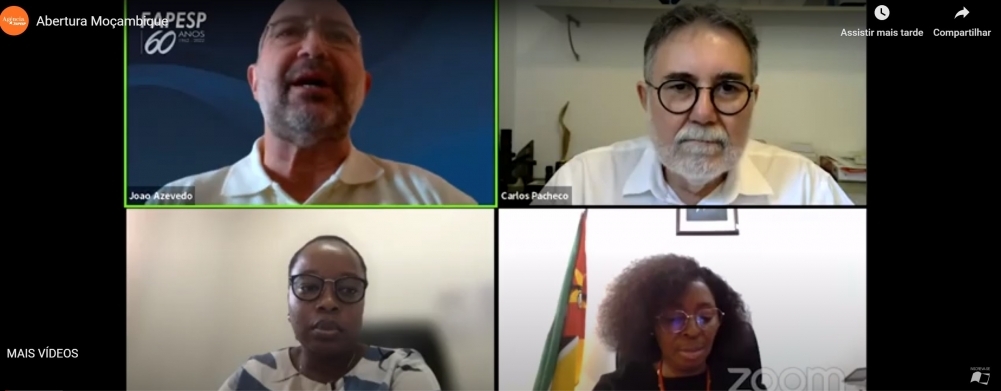


A webinar co-hosted by the two organizations featured researchers from São Paulo and the southeast African country discussing ways to promote scientific collaboration in areas such as climate change, natural disaster monitoring, agriculture, health, and bioenergy (image: screenshot taken during the event)
Published on 04/27/2023
By André Julião | Agência FAPESP – Issues that interest scientists in Mozambique and Brazil can now be the focus for collaborations aimed at developing solutions for both countries. The first steps were taken during a webinar held in early April by FAPESP and Mozambique’s National Research Foundation (FNI).
“We’ve learned from climate change and particularly from the pandemic that intense international collaboration is needed to cope with this type of challenge. FAPESP has a large network of cooperation partners around the world, but extending this network in Africa is hard, especially with regard to Portuguese-speaking countries,” said Carlos Américo Pacheco, CEO of FAPESP, in his opening remarks to the webinar.
In-person meetings will be held in future, he added, to bring together researchers based in São Paulo state, Brazil, and in Mozambique. FAPESP and FNI also plan to issue a joint call for proposals.
“It’s impossible to speak of Brazil without speaking of Mozambique because so many Brazilians are descendants of Mozambicans,” said Vitoria Langa de Jesus, Executive Director of FNI. “The thoughts of researchers in our two countries may be separated spatially, but they share the cause of eliminating poverty and rising above the fight for basic necessities. We want to increase cooperation with Brazil and FAPESP in science and technology, especially by funding joint projects. We want to make more use of our Brazilian cousins’ knowledge in various areas.”
The moderator was João Luiz Filgueiras de Azevedo, a member of FAPESP’s Adjunct Panel for Engineering and Exact Sciences. The main aim of the webinar, he said, was “to create an environment for the development of synergy” between researchers in São Paulo state and Mozambique, a country in southeast Africa.
Contexts
The webinar was divided into five thematic rooms, each of which corresponded to a possible area for future collaboration between researchers in the two countries: climate change, natural disaster monitoring, agriculture, health, and energy.
Paulo Artaxo, a professor at the University of São Paulo’s Physics Institute (IF-USP) and a member of the steering committee for the FAPESP Research Program on Global Climate Change (RPGCC), spoke about the effects of climate change on water availability.
“The nub of the climate crisis is the changing global carbon cycle, a key element for life on the planet,” he said. “We’re seeing profound changes in the carbon cycle and in the water cycle, both of which are essential to the maintenance of the ecosystem services that control the climate and the planet’s ecosystems.”
Ines Macamo Raimundo, a professor at Eduardo Mondlane University (UEM) in Maputo, noted that present-day Mozambique is the result of forced migrations, partly owing to climate change and drastic alterations in the rainfall regime in some regions. Other problems, from which the nation has not yet freed itself despite the end of the civil war in 1992, are also responsible.
“How to separate climate change from the other problems Mozambique has faced since the end of the war? We can’t look without considering the military conflicts. We will soon be celebrating the fiftieth anniversary of our independence, but we’ve never been at peace either in political and military terms or as far as natural disasters are concerned,” said Raimundo, also noting that conflicts are ongoing between the north and south of her country.
Synergy
Regina Alvalá, a researcher at Brazil’s National Disaster Surveillance and Early Warning Center (CEMADEN), and Carlos Serra, a researcher at UEM’s Center for Environmental Law, Diversity and Quality of Life, discussed disaster monitoring tools that could be useful to both countries.
Sílvia Helena Galvão de Miranda, a professor at the University of São Paulo’s Luiz de Queiroz College of Agriculture (ESALQ-USP), and Leonel Moiane, affiliated with the Agricultural Research Institute of Mozambique (IIAM), spoke about agricultural production in Brazil and southeast Africa.
In the thematic room on health, the Brazilian speaker was Ester Sabino, a professor at USP’s Institute of Tropical Medicine (IMT) and Coordinator of the Brazil-UK Center for Arbovirus Discovery, Diagnosis, Genomics and Epidemiology (CADDE), supported by FAPESP. The Mozambican speaker was Almeida Machamba, a professor at Lúrio University (UniLúrio). They discussed possible collaborative studies of various diseases that affect the populations of both countries.
Gláucia Souza, a professor at USP’s Chemistry Institute and a member of the steering committee for the FAPESP Bioenergy Research Program (BIOEN), and Urânio Muhanjane, a researcher at the University of Maputo, spoke about energy production from renewable sources.
“The potential interactions are perfectly clear. The seminar wasn’t intended to exhaust all topics, but to open up the possibilities we foresaw for future collaboration. We of the Global South tend to focus entirely on collaboration with the Global North, but of course South-South interactions are highly promising and present opportunities. I’m quite clear about the potential of this interaction,” said Luiz Eugênio Mello, then Scientific Director of FAPESP.
Videos of the event (in Portuguese) can be watched at: fapesp.br/15979/.
Source: https://agencia.fapesp.br/41255